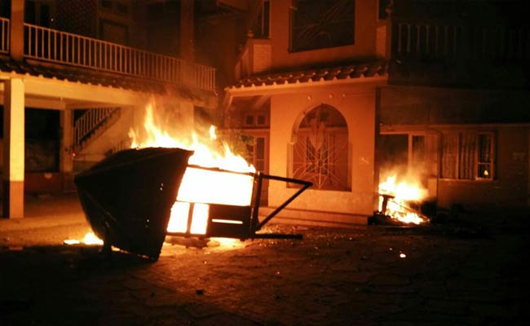Churachandpur, Sep 1: Three people have been killed after violence erupted in Manipur's Churachandpur town last evening over three bills passed in the state assembly yesterday. Indefinite curfew has been imposed in the area.
Five people were injured, two of them seriously, and the houses of Manipur's health minister Phungzathang Tonsing and five other lawmakers were set on fire during the protests. While two people died in police firing, one person was burnt to death and was the associate of an MLA whose home was burnt.
Groups opposed to the passing of three bills in the assembly -- that seek to regulate the entry of outsiders in the state through a permit system and carry out land reforms in the state -- went on rampage around 6 pm.
The lawmakers were targetted because none of them objected to the bills and allowed them to be passed, sources said. Their houses were set on fire and the mob prevented the police and fire engines from reaching the area. The minister and the lawmakers were reported to be safe.
Reports say the vehicle of Churachandpur Deputy Commissioner and his escort have also been torched.
The main objection, according to groups leading the protest, is to an amendment bill passed called Manipur Land Revenue & Land Reform Act (7th Amendment Bill 2015).
According to the protesters, this amendment will make tribal areas -- currently off limits to non-tribals -- accesible to all and lead to tribals, the Nagas and the Kukis, losing their land.
One of the clauses in the bills passed today is to set 1951 as the base year to identify non-indigenous people, who are regarded as outsiders by a section. The new law decrees that those who settled in Manipur before 1951 can have property rights. The rest will have to give up property and may even be asked to leave.
Protestors say most people living in the hill areas , partcicularly the Kuki tribe, share ethnic bonds with neighbouring Myanmar and don't have exact records of when they settled in these parts, and hence any cut-off is impractical.
Manipur has been witnessing violent agitations over the last three years for the implementation of the Inner Line Permit System.
The agitation is based on a belief that an influx of outsiders into the state has taken away jobs, and land from the indigenous people, unlike in states like neighbouring Nagaland, where the entry of outsiders is strictly regulated.






Comments
Add new comment